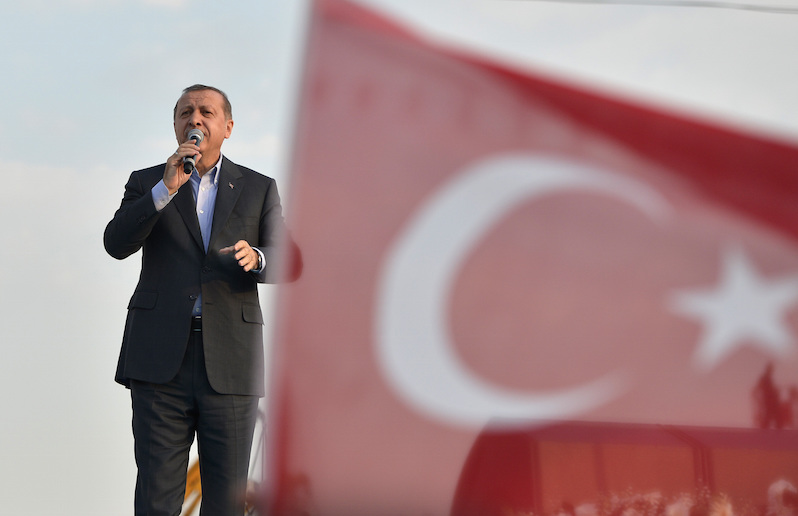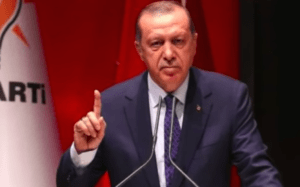Erdogan Claims Ultimate Power in Turkey After a Razor-Thin Referendum Victory
As an opponent noted: "Threats, oppression, imprisonment, censorship, defamation—and yet [nearly] half of the people of Turkey" voted against expanding the president's authority. Turkish President Recep Tayyip Erdogan, who further consolidated his power as a result of Sunday's referendum vote, speaks at a rally in Istanbul in September 2016. (Orlok / Shutterstock)
Turkish President Recep Tayyip Erdogan, who further consolidated his power as a result of Sunday's referendum vote, speaks at a rally in Istanbul in September 2016. (Orlok / Shutterstock)
By Lauren McCauley / Common Dreams
Turkish President Recep Tayyip Erdogan, who further consolidated his power as a result of Sunday’s referendum vote, speaks at a rally in Istanbul in September 2016. (Orlok / Shutterstock)
In a very close—and closely watched—referendum vote, Turks on Sunday handed President Recep Tayyip Erdogan what many say is authoritarian rule.
With more than 99 percent of ballots counted, Erdogan claimed a win with 51.36 percent voting in favor of the referendum [issue] and 48.64 voting against.
However, The Guardian reported:
… disparities persisted into Sunday evening, with the opposition saying not all ballots had been counted and they would contest a third of the votes that had been cast. [Sadi Guven, the head of Turkey’s high electoral board, or YSK] said the YSK had decided to consider unstamped ballots as valid unless they were proved to be fraudulent after a high number of complaints—including one from the ruling AK Party—that its officials had failed to stamp some ballot papers.
The no campaign said the YSK’s last-minute decision raised questions about the validity of the vote. […]
If confirmed, the vote will “transform Turkey into a presidential republic, in what would be one of the most significant developments in the nation’s history since its founding after the collapse of the Ottoman empire,” The Guardian reported earlier Sunday.
The referendum includes a series of constitutional amendments that would dissolve the role of the prime minister, centralizing state bureaucracy under the president while also giving him control of the judiciary. Further, it would allow Erdogan to run for two more election terms and essentially “rule by decree,” as Common Dreams previously wrote.
Polling ahead of the election had been close. However, as observers noted, many against the changes were afraid to speak out due to the widespread crackdown on dissent imposed by Erdogan after last summer’s failed coup attempt, which included the jailing of top political opponents and dozens of journalists.
While proponents of the referendum dominated the newspapers and airwaves, a split opposition led by Turkish citizens, largely the women, spread their message on social media using the hashtag #hayir (or “no”).
Indeed, while the ruling Justice and Development Party (or AKP Party) celebrated, many took to social media to express their dismay at the declared results and to point out that nearly half of the voters did not support the consolidation of power.
A dictatorship cannot sustain when half of the country says No. The political climate will change in Turkey. #referendum #No #Hay?r
— Ece Temelkuran (@ETemelkuran) April 16, 2017
with a fair election campaign #hay?r #na would have won gloriously. dont forget that this was *not* democracy in action. #turkeyreferendum
— Frederike Geerdink (@fgeerdink) April 16, 2017
Threats, oppression, imprisonment, censorship, defamation – and yet half of the people of Turkey voted #Hayir. Thanks to each and every one!
— Bumayé (@MaxRostock) April 16, 2017
Further, the three largest cities—Istanbul, Ankara, and Izmir—all voted against the referendum as did the majority of Kurdish voters indicating, as The Guardian observed, “a general decline in the ruling party’s support.
Highlighting the fierce divisions over the vote, Turkish journalist Ali Bayramoglu was reportedly “attacked by a group of around 30 people” when he went to cast his vote. Bayramoglu, who Hurryiet noted was formerly a “supporter of the ruling [AKP Party] but a vocal ‘No’ supporter in this referendum, was verbally and physically assaulted at an Elementary School polling place in the Gayrettepe district of Istanbul.
Your support is crucial…With an uncertain future and a new administration casting doubt on press freedoms, the danger is clear: The truth is at risk.
Now is the time to give. Your tax-deductible support allows us to dig deeper, delivering fearless investigative reporting and analysis that exposes what’s really happening — without compromise.
Stand with our courageous journalists. Donate today to protect a free press, uphold democracy and unearth untold stories.




You need to be a supporter to comment.
There are currently no responses to this article.
Be the first to respond.